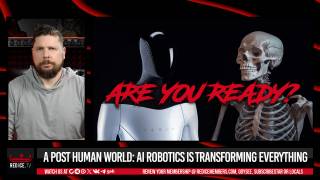Hawking: Creating AI would be biggest event in human history. It might also be the last.
Source: independent.co.uk
Success in creating AI would be the biggest event in human history. Unfortunately, it might also be the last, unless we learn how to avoid the risks, says a group of leading scientistsWith the Hollywood blockbuster Transcendence playing in cinemas, with Johnny Depp and Morgan Freeman showcasing clashing visions for the future of humanity, it’s tempting to dismiss the notion of highly intelligent machines as mere science fiction. But this would be a mistake, and potentially our worst mistake in history.Artificial-intelligence (AI) research is now progressing rapidly. Recent landmarks such as self-driving cars, a computer winning at Jeopardy! and the digital personal assistants Siri, Google Now and Cortana are merely symptoms of an IT arms race fuelled by unprecedented investments and building on an increasingly mature theoretical foundation. Such achievements will probably pale against what the coming decades will bring.The potential benefits are huge; everything that civilisation has to offer is a product of human intelligence; we cannot predict what we might achieve when this intelligence is magnified by the tools that AI may provide, but the eradication of war, disease, and poverty would be high on anyone’s list. Success in creating AI would be the biggest event in human history.Unfortunately, it might also be the last, unless we learn how to avoid the risks. In the near term, world militaries are considering autonomous-weapon systems that can choose and eliminate targets; the UN and Human Rights Watch have advocated a treaty banning such weapons. In the medium term, as emphasised by Erik Brynjolfsson and Andrew McAfee in The Second Machine Age, AI may transform our economy to bring both great wealth and great dislocation.Looking further ahead, there are no fundamental limits to what can be achieved: there is no physical law precluding particles from being organised in ways that perform even more advanced computations than the arrangements of particles in human brains. An explosive transition is possible, although it might play out differently from in the movie: as Irving Good realised in 1965, machines with superhuman intelligence could repeatedly improve their design even further, triggering what Vernor Vinge called a "singularity" and Johnny Depp’s movie character calls "transcendence".One can imagine such technology outsmarting financial markets, out-inventing human researchers, out-manipulating human leaders, and developing weapons we cannot even understand. Whereas the short-term impact of AI depends on who controls it, the long-term impact depends on whether it can be controlled at all.[...]Read the full article at: independent.co.ukThomas Sheridan - The Labyrinth of the Psychopath, The Intraspecies Predators & Transhumanism
Joseph P. Farrell & Scott D. de Hart - Hour 1 - Alchemical Transhumanism: Grimoire Technology & The New Man
John Lash - The Archons, The Transhuman Con & Divine Transactions
Anthony Gucciardi - Hour 1 - Boston Bombings, Gun Control & Transhumanism
Aaron Franz - The Philosophical Roots of Transhumanism & Technological Revolution
Aaron Franz - TransAlchemy, Save the Humans! & Transhuman Fundamentalism
William Henry - Stargates, Starwalkers & Transhumanism






















